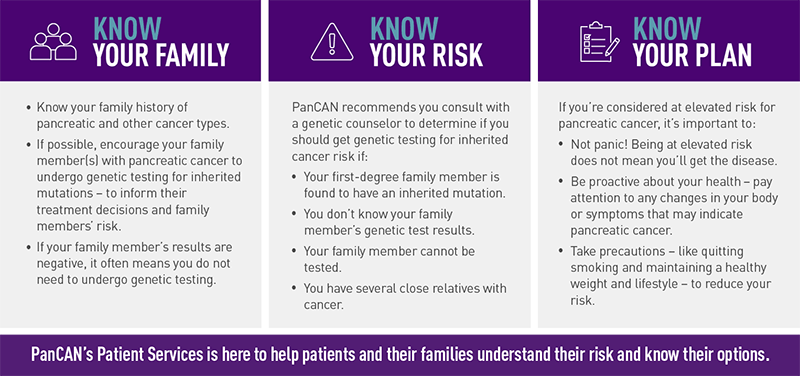
On This Page:
- Is Pancreatic Cancer Genetic?
- Is Pancreatic Cancer Hereditary?
- How Do You Know if Pancreatic Cancer in Your Family Is Hereditary?
- What Can You Do if You Have Hereditary Pancreatic Cancer in Your Family?
- How Can Knowing About an Inherited Genetic Mutation Help Patients?
- Genetics of Pancreatic Cancer Video
Is Pancreatic Cancer Genetic?
All cancers are genetic. DNA (deoxyribonucleic acid) is in every cell in our bodies. Each DNA strand contains many genes. All cancers begin when DNA mutations, or changes, cause cells to divide and grow out of control.
But this is different from hereditary cancer. Hereditary or familial cancer means that a risk for the disease runs in the family.
Is Pancreatic Cancer Hereditary?
About 10% of pancreatic cancers are hereditary. This means that for every 10 people with pancreatic cancer, one likely has an inherited mutation that increased their risk for developing the disease. Mutations that happen during a person’s lifetime, rather than inherited mutations, cause most pancreatic cancers. These mutations cannot be passed from parent to child.
But in some cases, mutated DNA passes from generation to generation. These are called germline mutations. These mutations may lead to hereditary pancreatic cancer. This is the only way pancreatic cancer is inherited.
Knowledge is power in the fight against pancreatic cancer.
- Know your family.
- Know your risk.
- Know your plan.

How Do You Know if Pancreatic Cancer in Your Family Is Hereditary?
If you are a first-degree relative of someone diagnosed with pancreatic cancer, you may have an increased risk of developing pancreatic cancer. Your family member with pancreatic cancer is strongly recommended to undergo genetic testing for inherited mutations.
- Negative results often mean you do not need to get genetic testing.
- If the results are positive, unknown or if you have several close family members with cancer, the Pancreatic Cancer Action Network recommends you consult with a genetic counselor to determine if you should get genetic testing for inherited cancer risk and if you should discuss options for monitoring.
The risk increases if more family members are affected with pancreatic cancer or other specific cancers or conditions, including:
- Familial breast, ovarian or colon cancer
- Familial melanoma
- Hereditary pancreatitis: repeating pancreatic inflammation, generally starting by age 20
- Inherited genetic syndromes associated with pancreatic cancer
Use our family history worksheet to better understand your risk of hereditary pancreatic cancer.
Being at higher risk or having a family history of pancreatic cancer does not mean that you will definitely get the disease.
Contact PanCAN’s PanCAN Patient Services to get more information about risk, to understand the different tests or for help finding a genetic counselor.
What Genes Are Associated with Hereditary Pancreatic Cancer?
Researchers are studying several hereditary syndromes and genes for connections to pancreatic cancer, including:
- BRCA mutation
- Cystic Fibrosis
- Familial Adenomatous Polyposis (FAP)
- Familial Atypical Multiple Mole Melanoma (FAMMM)
- Hereditary Nonpolyposis Colorectal Cancer (HNPCC) or Lynch Syndrome
- Hereditary Pancreatitis
- PALB2 mutation
- Peutz-Jeghers Syndrome
Learn more about genetic mutations.
PanCAN Patient Services can also give you more information on hereditary syndromes linked to pancreatic cancer.
If You Have One of These Disorders, Does That Mean You Will Get Pancreatic Cancer?
Having a genetic condition related to pancreatic cancer does not mean a person will definitely get pancreatic cancer. But it does mean they may be more likely to get the disease than others.
If you think you may be at risk for pancreatic cancer, talk to your doctor or genetic counselor. A genetic counselor can give you information on genetic testing and help figure out which tests may be right for you.
The only way to be sure you have a mutation associated with pancreatic cancer is to meet with a genetic counselor and get tested.
What Is a Genetic Counselor?
Genetic counselors are trained in the medical and emotional aspects of inherited diseases. An oncology genetic counselor specializes in counseling and educating people with cancer and their family members who may have a higher chance of developing cancer.
Learn more about genetic counseling.
A genetic counselor can also help you and your family decide if you should get genetic testing.
What Is Genetic Testing?
Genetic testing looks for inherited mutations. The alterations to a person’s DNA are the same throughout their whole body. So, this analysis is usually done on a blood or saliva sample.
All people diagnosed with pancreatic cancer, regardless of family history, should have genetic testing to help with treatment decisions. If genetic testing shows a germline mutation, then their loved ones could consider getting tested also.
Carriers of a genetic alteration are at higher risk than most people. But this does not mean that they will definitely develop the disease.
Genetic tests can be expensive. Insurance may cover the testing, but not always. Genetic counselors can help by telling your insurance company the importance of genetic counseling and having the testing covered for you.
Talk to your doctor or a genetic counselor to choose the tests and next steps that are right for you.
What Can You Do if You Have Hereditary Pancreatic Cancer in Your Family?
 If a genetic counselor believes you are at a higher risk for developing the disease:
If a genetic counselor believes you are at a higher risk for developing the disease:
- Experts recommend enrolling in a surveillance program if you qualify.
- Some doctors recommend yearly imaging scans. These scans often start at age 50 but may start sooner if pancreatic cancer has happened in that person’s family earlier in life.
- You can take part in genetic or family registries.
For information on surveillance programs in your area and a list of genetic registries, contact PanCAN Patient Services.
What Is a Surveillance Program?
In a surveillance, early detection or screening program, doctors actively check people who are at risk of getting pancreatic cancer.
The goal is to find early pancreatic cancer and pre-cancerous lesions. Patients whose disease is found in its earlier stages have better outcomes. This is because they are more likely to be able to have surgery.
Surveillance programs usually use imaging tests to watch patients. They may also collect blood or pancreatic fluids to test.
Benefits of taking part in a surveillance program include:
- Knowledgeable doctors monitoring you
- Possible help from new diagnostic tests
- Helping advance early detection efforts
Before enrolling in a surveillance program, you should understand the risks and benefits of screening. The healthcare professionals running the program can help you with this.
What Is a Genetic Registry?
Genetic or family registries collect information about families with multiple pancreatic cancer diagnoses. This often includes information about a family’s:
- Environment
- Lifestyle habits
- History of pancreatic cancer
- Incidence of other cancers in the family
The goal is to find common aspects in families with multiple pancreatic cancer cases that will lead to better understanding of the disease. Registries are vital to research on hereditary pancreatic cancer causes.
Family registries do not offer tests or screening for early detection of pancreatic cancer.
How Can Knowing About an Inherited Genetic Mutation Help Patients?
Besides increasing risk for pancreatic cancer, some germline mutations affect treatment options for those who get the disease. Using the patient’s biology to figure out the best treatment options for a person is called precision medicine. Patients who receive treatment based on their biology can live longer.
As soon as possible after diagnosis, the Pancreatic Cancer Action Network strongly recommends all pancreatic cancer patients get genetic testing for inherited mutations and biomarker testing of their tumor tissue. These tests will help the healthcare team figure out the best treatment options for the patient and inform family members of risk.
Patients should discuss both tests with their care team. The tests can be available through their treating institution or PanCAN’s Know Your Tumor® precision medicine service.
Genetics of Pancreatic Cancer Video
We’re Here to Help
Contact PanCAN Patient Services for free, in-depth information about pancreatic cancer risk factors, genetic tests, genetic counseling and screening and surveillance programs.
Related Topics
-
Genetic Counseling
Learn how genetic counselors can help those worried about their pancreatic cancer risk.
-
Genetic Mutations
See what hereditary disorders are connected to pancreatic cancer.
-
Risk Factors
Understand what makes people more likely to get pancreatic cancer.
-
Real Talk about Testing
Hear three people talk about their own testing experiences.
Information reviewed by PanCAN’s Scientific and Medical Advisory Board, who are experts in the field from such institutions as University of Pennsylvania, Memorial Sloan-Kettering Cancer Center, Virginia Mason Medical Center and more.
Information provided by the Pancreatic Cancer Action Network, Inc. (“PanCAN”) is not a substitute for medical advice, diagnosis, treatment or other health care services. PanCAN may provide information to you about physicians, products, services, clinical trials or treatments related to pancreatic cancer, but PanCAN does not recommend nor endorse any particular health care resource. In addition, please note any personal information you provide to PanCAN’s staff during telephone and/or email communications may be stored and used to help PanCAN achieve its mission of assisting patients with, and finding cures and treatments for, pancreatic cancer. Stored constituent information may be used to inform PanCAN programs and activities. Information also may be provided in aggregate or limited formats to third parties to guide future pancreatic cancer research and education efforts. PanCAN will not provide personal directly identifying information (such as your name or contact information) to such third parties without your prior written consent unless required or permitted by law to do so. For more information on how we may use your information, you can find our privacy policy on our website at https://www.pancan.org/privacy/.





